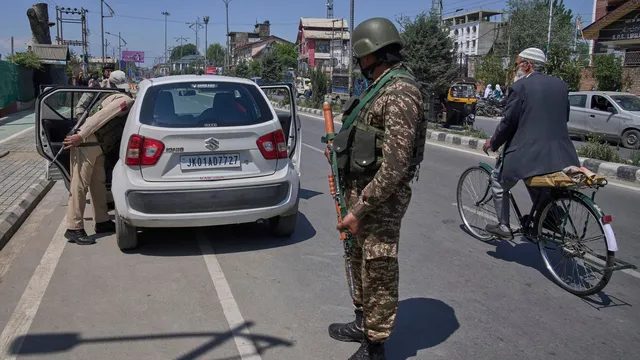
India prepares military response amid rising tensions with Pakistan
2025-05-03 08:21- Following a deadly terrorist attack on April 22 in Pahalgam, India launched extensive counter-terrorism operations in Jammu and Kashmir.
- Pakistan has alleged it possesses credible intelligence about an impending Indian military strike, claiming it could occur within 24 to 36 hours.
- The situation has escalated tensions between both nations, prompting discussions on potential military conflict and a call for international intervention.
Express your sentiment!
Insights
In recent days, tensions between India and Pakistan have escalated dramatically following a terrorist attack in Jammu and Kashmir. On April 22, 2025, gunmen opened fire on a group of tourists in Pahalgam, resulting in the deaths of 26 individuals, primarily Indian nationals. This attack has reignited longstanding accusations from India against Pakistan regarding the support of militant groups operating in the region. Authorities suspect that The Resistance Front, a group linked to Lashkar-e-Taiba, is responsible for the assault. In response, Indian Prime Minister Narendra Modi condemned the violence, asserting the need to hold the perpetrators accountable. Consequently, India has intensified counter-terrorism operations across various locations in Jammu and Kashmir, with reports indicating that four operations are actively taking place. This security crackdown reflects India's commitment to respond decisively to threats against its citizens. In tandem with these military preparations, India has expelled Pakistani nationals, suspended visa services for their citizens, and closed the only operative land border crossing between the two nations. The Indian government aims to deter any potential terrorist activities and reassure the public of its resolve in maintaining national security. As the situation evolves, both nations make conflicting claims regarding culpability. Pakistani officials allege they possess credible intelligence suggesting an imminent Indian military incursion, potentially under the pretext of retaliation for the attack in Pahalgam. Information Minister Attaullah Tarar stated that Pakistan is ready to defend its sovereignty if provoked by Indian military actions. The Pakistani government has called for a neutral investigation into the Pahalgam attack, labeling Indian accusations as baseless and accusing India of adopting a confrontational stance in response to perceived threats. The international community is watching the developments closely, as both India and Pakistan are nuclear-armed states. The potential for armed conflict raises concerns about regional stability and the humanitarian implications for civilians caught in the crossfire. Diplomatic efforts to de-escalate tensions have so far been met with limited success, and the cycle of blame continues as both governments prepare for what might be a significant military confrontation in response to the rising violence in Kashmir.
Contexts
The history of military conflicts between India and Pakistan is characterized by a series of wars, skirmishes, and ongoing tensions that stem from their tumultuous partition in 1947. The partition led to the creation of two sovereign states, with communal violence erupting as populations were displaced across the newly drawn borders. The most salient issues contributing to hostilities have revolved around the disputed territory of Kashmir, which both nations claim in full but control only in parts. This territorial contention became a flashpoint soon after independence, catalyzing the first Indo-Pakistani War of 1947-1948 shortly after the two nations were established. A United Nations-mediated ceasefire in 1949 created the Line of Control, effectively dividing Kashmir between the two countries but leaving the dispute unresolved and continuing to fuel military tensions in subsequent years. The second major conflict occurred in 1965 when Pakistan initiated a military operation in Kashmir, which escalated into full-scale war between the nations. The conflict saw significant battles but culminated in a stalemate, with both nations returning to their pre-war positions following international intervention, notably through the Tashkent Agreement facilitated by the Soviet Union. The Indo-Pakistani War of 1971 marked another turning point when India intervened in what was then East Pakistan, leading to the creation of Bangladesh. This war not only showcased India's military capabilities but also amplified national sentiments on both sides, embedding a deeper animosity, especially as India emerged from this conflict significantly strengthened. The nuclear capabilities of both nations marked a new chapter in their military confrontations, beginning with India’s nuclear test in 1974 and followed by Pakistan's tests in 1998. The Kargil War in 1999 represented a distinct period of conflict as Pakistani forces infiltrated positions on the Indian side of the Line of Control. This conflict highlighted the complexities of guerilla warfare and the challenges of mountainous terrain, and it reaffirmed the critical need for diplomatic engagement, which both countries have intermittently pursued despite their entrenched hostilities. Each military encounter has left a lasting impact on national narratives and military strategies, inflating defense budgets and influencing regional geopolitical alignments. In recent years, the landscape of Indo-Pakistani relations has continued to shift under the influence of various factors including domestic political climates, international pressure, and sub-state actors. Continued skirmishes along the Line of Control, and incidents of cross-border terrorism attributed to militant groups operating from Pakistan, have exacerbated tensions, often provoking military responses from India. Diplomatic attempts towards resolution remain fraught with challenges, yet both nations find themselves compelled to engage in dialogue to prevent escalation to a more catastrophic conflict. The intricate history of military conflicts between India and Pakistan serves as a microcosm of broader regional instability, underscoring the persistent struggle over national identity, territorial integrity, and the quest for sovereignty.